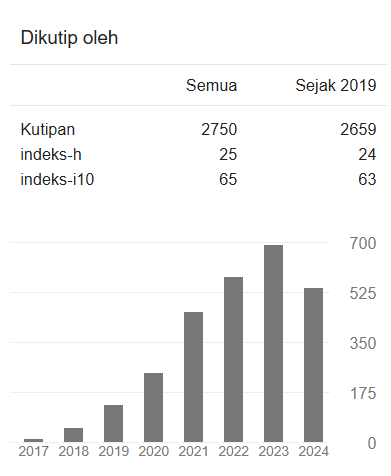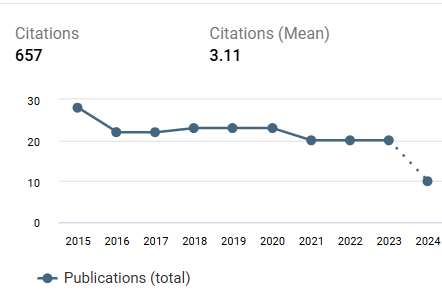PENGEMBANGAN INSTRUMEN PENILAIAN KOMPETENSI MEMBACA PADA MATA PELAJARAN BAHASA INDONESIA KELAS VII BERBASIS QUIPPER SCHOOL
DOI:
https://doi.org/10.22219/jinop.v2i2.3635Keywords:
Development of Assessment Tools, Competency Reading, Quipper School.Abstract
ABSTRAK: Penelitian pengembangan ini bertujuan menghasilkan sebuah produk yang berupa instrumen penilaian kompetensi membaca pelajaran Bahasa Indonesia kelas VII berbasis Quipper School. Penelitian ini difokuskan pada aspek struktur, isi, dan bahasa yang menggunakan Quipper School sebagai media online dengan teknik tes objektif. Pengembangan produk yang berupa instrumen menggunakan model R2D2 (recursive, reflective, design, and development). Metode penelitian pengembangan juga didasarkan pada pendapat Sugiyono (2013:407) bahwa metode penelitian digunakan untuk menghasilkan produk tertentu dan menguji keefektifan produk tersebut. Instrumen penilaian yang digunakan memiliki tiga fokus kerja, yaitu (1) penetapan, (2) desain dan pengembangan, dan (3) diseminasi. Produk yang dikembangkan adalah instrumen penilaian kompetensi membaca kelas VII berbasis Quipper School dengan hasil telaah berupa (1) penilaian, (2) masukan kritik dan saran dengan fokus pembahasan pada tiga aspek, yaitu struktur, isi, dan bahasa.yang melibatkan tim ahli dan praktisi. Produk pengembangan ini memiliki struktur (1) soal semester gasal dan (2) soal semester genap. Kajian terhadap produk hasil penelitian dan pengembangan ini difokuskan terhadap keunggulan produk, kelemahan produk, dan antisipasi kelemahan produk.
Kata kunci: Pengembangan Instrumen Penilaian, Kompetensi Membaca, Quipper School.
ABSTRACT: The study was based on an assessment conducted in SMP Muhammadiyah 8 Stone still conventional and not utilizing internet technology. Determination of reading skills as competence taught in schools has implications for the development of assessment instruments are made. Indonesian Teachers need to develop appropriate assessment tools to assess student achievement in reading aspect. Moreover, in 2015 the government has held a UN (National Examination) for students of SMP / MTs and SMA / MA online special at some designated schools. Therefore, this study aimed to produce a product in the form of reading competence assessment instruments Indonesian Language class VII School Quipper based on aspects of the structure and contents, as well as aspects of the language. The product development process is using the working principle of R2D2 (recursive, reflective design and development). Competency assessment instrument reading in class VII-based Quipper School has three foci of work, namely (1) the determination, (2) design and development, and (3) dissemination. Products developed through this research is a standard assessment instrument grade reading competency-based Quipper VII School. Because based Quipper School, there are two aspects that are reviewed by experts, namely (1) the structure and content and (2) language. Data on each aspect is divided into two kinds, including (1) the review of the form of assessment and (2) the review of the form of input criticisms and suggestions. Discussion on the development of products focused on three aspects, namely the structure, content and language. The products developed are standards of competency assessment tools to read in Indonesian Language class VII. This product has the structure (1) about the odd semester and (2) about the second semester. The study on product research and development is focused on product excellence, product weaknesses, and the anticipated weakness of the product.
Keywords: Development of Assessment Tools, Competency Reading, Quipper School.
Downloads
Downloads
Published
How to Cite
Issue
Section
License
Copyright Notice
Authors who publish with JINoP (Jurnal Inoasi Pembelajaran) agree to the following terms:
- For all articles published in the JINoP (Jurnal Inovasi Pembelajaran), copyright is retained by the authors. Authors give permission to the publisher to announce the work with conditions. When the manuscript is accepted for publication, the authors agree to the automatic transfer of the publishing right to the publisher.
- Authors retain copyright and grant the journal the right of first publication with the work simultaneously licensed under a Creative Commons Attribution 4.0 International License. that allows others to share the work with an acknowledgment of the work's authorship and initial publication in this journal.
- Authors are able to enter into separate, additional contractual arrangements for the non-exclusive distribution of the journal's published version of the work (e.g., post it to an institutional repository or publish it in a book), with an acknowledgment of its initial publication in this journal.
- Authors are permitted and encouraged to post their work online (e.g., in institutional repositories or on their website) prior to and during the submission process, as it can lead to productive exchanges, as well as earlier and greater citation of published work (See The Effect of Open Access).








